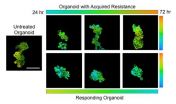INFORMATION:
Politics can interact with evolution to shape human destiny
2014-10-28
(Press-News.org) Politics can have unintentional evolutionary consequences that may cause hastily issued policies to cascade into global, multigenerational problems, according to political scientists.
"Most western democracies look at policies as if they are bandages, we fix what we can and then move on," said Pete Hatemi, associate professor of political science, Penn State. "But we need to consider generational policies so that we can fix what we can now, but also be prepared for what comes next."
The researchers said that there is an interaction between political and cultural forces and evolutionary results. Genes can shape culture and political institutions, which in turn can shape biology and physiology, passing on certain traits to future generations.
The environment's influence on adaptation and how it changes biology is better known and often easier to observe, said Hatemi, but the way culture can affect gene expressions in future generations is often harder to show and may take longer to reveal itself.
One more obvious way to see how culture affects natural selection is the effect that politically inspired atrocities -- for example, Communist purges in China and USSR and the Nazi Holocaust -- have on genetic diversity, according to the researchers, who released their findings in a recent issue of Advances in Political Psychology.
Other examples are just beginning to be studied. For example, researchers are starting to investigate whether, in certain conflicts, such as the Sudan, children who endured violence as soldiers, or mothers who suffered stress and malnutrition during famines, experience shifts in gene expression.
"Biology is affected by culture just as culture is changed by human biology," the researchers write.
Hatemi, who worked with Rose McDermott, the David and Marianna Fisher University Professor of International Relations, Brown University, said this interaction between culture and biology could explain why some troubled hot spots remain troubled over many years. People who are born in aggressive environments may pass on traits that make it more likely that future generations react to certain situations violently, he added.
"These changes, then, may have a long-range effect on children and on who those children become when they grow up," said Hatemi. "Those who grow up in a violent culture may have more of a tendency to respond with aggression in the future."
Another problem is that politicians typically create policies in a one-size-fits-all approach, Hatemi said, but there are considerable differences among groups.
"Education is a good example," said Hatemi. "We try to create educational policies to benefit the greatest number of people, but we also know that not everyone responds to education in the same way."
A similar dynamic may be at work in the creation of policies that guide health care and foreign affairs. Not all groups respond to diets in the same way, for example, and reproductive health varies across populations.
"We suggest that one of the reasons for the common failure of well-designed, well-intentioned social programs lies in the implicit 'one size fits all' assumptions, as well as the mismatch between modern intentions and older psychological drives and incentives," the researchers write.
While genetics is often seen as a rigid blueprint for destiny, the researchers suggest that humans are extremely adaptable and capable, to some degree, of molding evolutionary forces for good and bad. Humans have managed their environment by developing everything from tools and weapons to medical technologies, from crutches to vaccines.
"Evolution and genetic influence are, of course, important, but that doesn't mean it's fixed," Hatemi said. "We can shape policies that can shape evolution."
ELSE PRESS RELEASES FROM THIS DATE:
Identifying 'stance taking' cues to enable sophisticated voice recognition
2014-10-28
WASHINGTON, D.C., October 28, 2014 – In the future, computers may be capable of talking to us during meetings just like a remote teleconference participant. But to help move this science-fiction-sounding goal a step closer to reality, it's first necessary to teach computers to recognize not only the words we use but also the myriad meanings, subtleties and attitudes they can convey.
During the 168th Meeting of the Acoustical Society of America (ASA), to be held October 27-31, 2014, at the Indianapolis Marriott Downtown Hotel, Valerie Freeman, a Ph.D. candidate in ...
Improving breast cancer chemo by testing patient's tumors in a dish
2014-10-28
One of the tragic realities of cancer is that the drugs used to treat it are highly toxic and their effectiveness varies unpredictably from patient to patient. However, a new "tumor-in-a-dish" technology is poised to change this reality by rapidly assessing how effective specific anti-cancer cocktails will be on an individual's cancer before chemotherapy begins.
A team of biomedical engineers at Vanderbilt University headed by Assistant Professor Melissa Skala has developed the technique, which uses fluorescence imaging to monitor the response of three-dimensional chunks ...
NASA gets a stare from Cyclone Nilofar's 14 mile-wide eye
2014-10-28
Tropical Cyclone Nilofar developed an eye on Oct. 28 that seemed to stare at NASA's Terra satellite as it passed overhead in space. Warnings are already in effect from the India Meteorological Department as Nilofar is forecast to make landfall in northwestern India.
On Oct. 28 at 06:50 UTC (2:50 a.m. EDT) the MODIS instrument aboard Terra captured a visible image of Tropical Cyclone Nilofar after it developed an eye while moving north in the Arabian Sea. The 12 nautical mile (13.8 miles/22.2 km) wide eye was surrounded by powerful thunderstorms and bands of thunderstorms ...
UC Davis scientists discover exact receptor for DEET that repels mosquitoes
2014-10-28
DEET has been the gold standard of insect repellents for more than six decades, and now researchers led by a University of California, Davis, scientist have discovered the exact odorant receptor that repels them.
They also have identified a plant defensive compound that might mimic DEET, a discovery that could pave the way for better and more affordable insect repellents. Findings from the study appear in the journal Proceedings of the National Academy of Sciences.
More than 200 million people worldwide use DEET, developed by scientists at the U.S. Department of Agriculture ...
Figuring out how we get the nitrogen we need
2014-10-28
Nitrogen is an essential component of all living systems, playing important roles in everything from proteins and nucleic acids to vitamins. It is the most abundant element in Earth's atmosphere and is literally all around us, but in its gaseous state, N2,, it is inert and useless to most organisms. Something has to convert, or "fix," that nitrogen into a metabolically usable form, such as ammonia. Until about 100 years ago when an industrial-scale technique called the Haber-Bosch process was developed, bacteria were almost wholly responsible for all nitrogen fixation on ...
Glacier song
2014-10-28
Boulder, Colo., USA - Mountain glaciers represent one of the largest repositories of fresh water in alpine regions. However, little is known about the processes by which water moves through these systems. In this study published in Geology on 24 Oct. 2014, David S. Heeszel and colleagues use seismic recordings collected near Lake Gornersee in the Swiss Alps to look for signs of water moving through fractures near the glacier bed. Analysis of these recordings reveals, for the first time, that harmonic tremor occurs within mountain glaciers and that individual icequakes at ...
Are 'flops' a success in basketball?
2014-10-28
BEER-SHEVA, Israel, October 28, 2014... A lack of sufficient punishment for deception facilitates "flopping" in basketball, according to new research from Ben-Gurion University of the Negev (BGU), which revealed that two-thirds of the falls were found to be intentional. Based on the research, the authors believe that players and teams are unaware of the cost/benefit analysis of "flopping" or the negative effect of falling if no offensive foul is awarded, which is indeed the case 90 percent of the time.
In the study, published recently in the Journal of Economic Behavior ...
Salt-loving plants may be key to global efforts for sustainable food production
2014-10-28
Farmland is vanishing in part because the salinity in the soil is rising as a result of climate change and other man-made phenomena. In an Opinion piece publishing in the Cell Press journal Trends in Plant Sciences, researchers propose a new concept for breeding salt- tolerant plants as a way to contribute to global efforts for sustainable food production.
"We suggest that we should learn from nature and do what halophytes, or naturally salt-loving plants, are doing: taking up salt but depositing it in a safe place—external balloon-like structures called salt bladders," ...
Scientists find genetic variants influence a person's response to statins
2014-10-28
A large analysis of over 40,000 individuals on statin treatment has identified two new genetic variants which influence how 'bad' cholesterol levels respond to statin therapy.
Statins are widely prescribed to patients and have been shown to lower bad cholesterol levels by up to 55%, making them a highly effective method of reducing risk of heart disease. However, despite this success, patient response can vary widely.
The study, led by Queen Mary University of London and published in Nature Communications, is the largest to date and involved analysing data from six ...
Compensation and punishment: 'Justice' depends on whether or not we're a victim
2014-10-28
We're more likely to punish wrongdoing as a third party to a non-violent offense than when we're victimized by it, according to a new study by New York University psychology researchers. The findings, which appear in the journal Nature Communications, may offer insights into how juries differ from plaintiffs in seeking to restore justice.
Their study, conducted in the laboratory of NYU Professor Elizabeth Phelps, also shows that victims, rather than seeking to punish an offender, instead seek to restore what they've lost.
"In our legal system, individuals are presented ...


